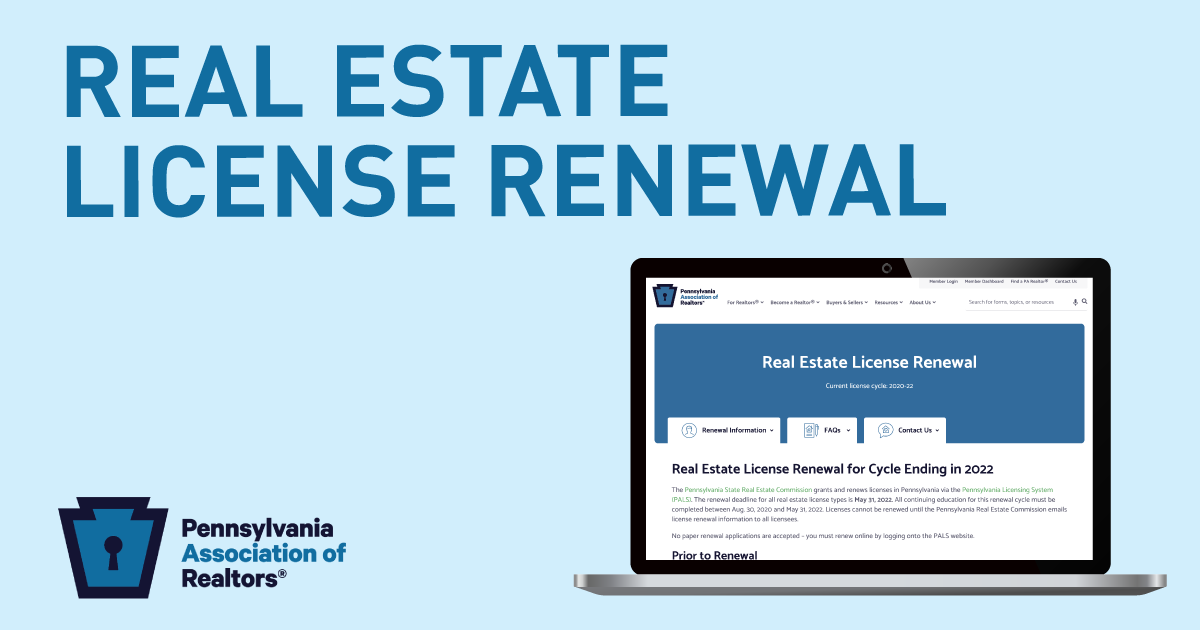
To become a licensed Pennsylvania real-estate agent, you will need to meet the state requirements, take a course, and pass the licensing examination. The process takes around a week and it is very simple. However, a real estate license can be costly. There are fees to attend the education courses and for any other business expenses. In addition to that, you'll need to pay for a personal marketing campaign and continuing education.
You'll be asked to complete an application, submit documentation, and take an exam. All of this can be done online, which simplifies the whole process.
First, you must earn a high school diploma, which can be done by taking an accredited course. Make sure that your background checks have been updated. For instance, you'll need to have a valid criminal background check if you want to work with children. If you can prove that you have an emergency, a serious illness or financial hardship, you can qualify for an exemption.

The next step is to complete at least four credit hours of real estate instruction. These can be acquired by attending classes at an accredited school by Pennsylvania Real Estate Commission. If you don't have a school near you, you can opt for an online course. It is a good idea to enroll in a program that allows you to work at your own pace.
Next, you need to obtain a license from Pennsylvania Real Estate Commission. Your license costs $176 and includes a wallet-sized copy. The license is not completely free. However, you will have to pay the broker who sponsored your application and the real estate commission. A license is valid for two years. A renewal fee of $96, which can be paid via credit card, is required.
Finally, you'll need to take a course of study that teaches you about the state of the real estate market in Pennsylvania. You can also become a leasing agent if you don't want to work full-time. Leasing agents can earn a great income part-time while still enjoying stability and career growth in the real estate industry.
To better prepare for your PA real-estate licensing exam, you can purchase a glossary. The glossary lists key terms in real estate and can be found as a PDF on the PALS web site. Although you don't have to log in, the glossary can help you understand important terminology without you spending your precious time reading.

Find a reliable, trustworthy resource to help you with your education. Audio lessons are an option. Listening to lectures can help you gain knowledge on topics that you are not familiar with. Another tip is to take an interactive quiz online.
FAQ
Is it possible to get a second mortgage?
Yes. However, it's best to speak with a professional before you decide whether to apply for one. A second mortgage is often used to consolidate existing loans or to finance home improvement projects.
How do you calculate your interest rate?
Market conditions impact the rates of interest. The average interest rate for the past week was 4.39%. The interest rate is calculated by multiplying the amount of time you are financing with the interest rate. For example, if you finance $200,000 over 20 years at 5% per year, your interest rate is 0.05 x 20 1%, which equals ten basis points.
Which is better, to rent or buy?
Renting is generally cheaper than buying a home. It's important to remember that you will need to cover additional costs such as utilities, repairs, maintenance, and insurance. Buying a home has its advantages too. For instance, you will have more control over your living situation.
How much money can I get to buy my house?
This varies greatly based on several factors, such as the condition of your home and the amount of time it has been on the market. Zillow.com shows that the average home sells for $203,000 in the US. This
Statistics
- This seems to be a more popular trend as the U.S. Census Bureau reports the homeownership rate was around 65% last year. (fortunebuilders.com)
- Some experts hypothesize that rates will hit five percent by the second half of 2018, but there has been no official confirmation one way or the other. (fortunebuilders.com)
- It's possible to get approved for an FHA loan with a credit score as low as 580 and a down payment of 3.5% or a credit score as low as 500 and a 10% down payment.5 Specialty mortgage loans are loans that don't fit into the conventional or FHA loan categories. (investopedia.com)
- The FHA sets its desirable debt-to-income ratio at 43%. (fortunebuilders.com)
- When it came to buying a home in 2015, experts predicted that mortgage rates would surpass five percent, yet interest rates remained below four percent. (fortunebuilders.com)
External Links
How To
How to Manage A Rental Property
Although renting your home is a great way of making extra money, there are many things you should consider before you make a decision. We'll show you what to consider when deciding whether to rent your home and give you tips on managing a rental property.
Here are the basics to help you start thinking about renting out a home.
-
What are the first things I should consider? Take a look at your financial situation before you decide whether you want to rent your house. If you have debts, such as credit card bills or mortgage payments, you may not be able to afford to pay someone else to live in your home while you're away. Your budget should be reviewed - you may not have enough money to cover your monthly expenses like rent, utilities, insurance, and so on. This might be a waste of money.
-
How much does it cost for me to rent my house? The cost of renting your home depends on many factors. These factors include the location, size and condition of your home, as well as season. Keep in mind that prices will vary depending upon where you live. So don't expect to find the same price everywhere. Rightmove shows that the median market price for renting one-bedroom flats in London is approximately PS1,400 per months. This would translate into a total of PS2,800 per calendar year if you rented your entire home. That's not bad, but if you only wanted to let part of your home, you could probably earn significantly less.
-
Is it worth it? You should always take risks when doing something new. But, if it increases your income, why not try it? You need to be clear about what you're signing before you do anything. It's not enough to be able to spend more time with your loved ones. You'll need to manage maintenance costs, repair and clean up the house. Make sure you've thought through these issues carefully before signing up!
-
Is there any benefit? You now know the costs of renting out your house and feel confident in its value. Now, think about the benefits. Renting your home is a great way to get out of the grind and enjoy some peace from your day. It's more fun than working every day, regardless of what you choose. If you plan well, renting could become a full-time occupation.
-
How do I find tenants Once you decide that you want to rent out your property, it is important to properly market it. Listing your property online through websites like Rightmove or Zoopla is a good place to start. After potential tenants have contacted you, arrange an interview. This will help to assess their suitability for your home and confirm that they are financially stable.
-
How can I make sure I'm covered? If you are worried about your home being empty, it is important to make sure you have adequate protection against fire, theft, and damage. You will need insurance for your home. This can be done through your landlord directly or with an agent. Your landlord will likely require you to add them on as additional insured. This is to ensure that your property is covered for any damages you cause. This doesn't apply to if you live abroad or if the landlord isn’t registered with UK insurances. You will need to register with an International Insurer in this instance.
-
Sometimes it can feel as though you don’t have the money to spend all day looking at tenants, especially if there are no other jobs. Your property should be advertised with professionalism. You should create a professional-looking website and post ads online, including in local newspapers and magazines. You'll also need to prepare a thorough application form and provide references. Some people prefer to do everything themselves while others hire agents who will take care of all the details. In either case, be prepared to answer any questions that may arise during interviews.
-
What should I do after I have found my tenant? If you have a contract in place, you must inform your tenant of any changes. If you don't have a lease, you can negotiate length of stay, deposit, or other details. While you might get paid when the tenancy is over, utilities are still a cost that must be paid.
-
How do I collect rent? When it comes time for you to collect your rent, check to see if the tenant has paid. You'll need remind them about their obligations if they have not. You can deduct any outstanding payments from future rents before sending them a final bill. You can always call the police to help you locate your tenant if you have difficulty getting in touch with them. If there is a breach of contract they won't usually evict the tenant, but they can issue an arrest warrant.
-
How can I avoid problems? It can be very lucrative to rent out your home, but it is important to protect yourself. Ensure you install smoke alarms and carbon monoxide detectors and consider installing security cameras. You should also check that your neighbors' permissions allow you to leave your property unlocked at night and that you have adequate insurance. You should not allow strangers to enter your home, even if they claim they are moving in next door.